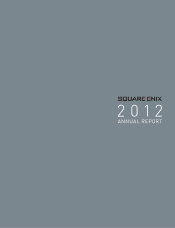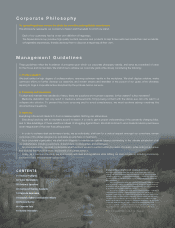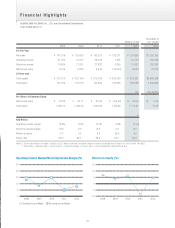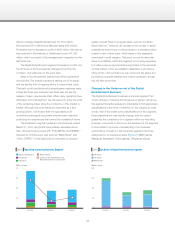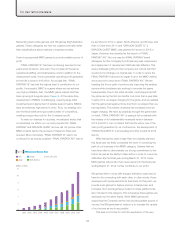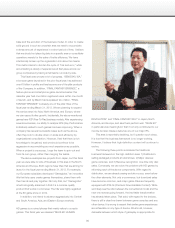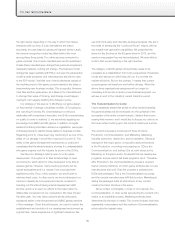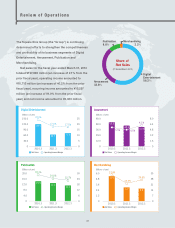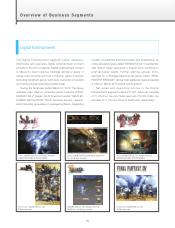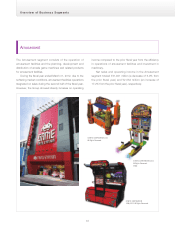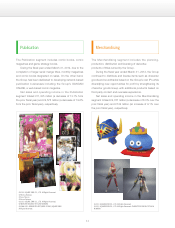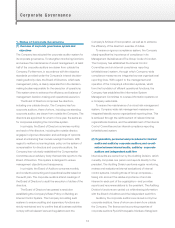Square Enix 2012 Annual Report Download - page 7
Download and view the complete annual report
Please find page 7 of the 2012 Square Enix annual report below. You can navigate through the pages in the report by either clicking on the pages listed below, or by using the keyword search tool below to find specific information within the annual report.
base and the evolution of the business model. In order to create
solid ground in such an uncertain area we need to accumulate
a dense amount of experience in a short period of time. I believe
that we should not place big bets in a specific area or consolidate
operations merely for the sake of better efficiency. We have
intentionally broken up the organization into about ten teams.
This method aims to shorten the cycle of “trial and error,” while
accumulating a variety of experiences at fast-pace across our
group companies by having small teams run side by side.
This fiscal year we saw a lot of progress. “SENGOKU IXA,”
a browser game launched in the prior fiscal year, has achieved
over ¥3 billion in profits and has become one of the pillar products
of the Company. In addition, “FINAL FANTASY BRIGADE,” a
feature phone and smartphone game launched earlier this
calendar year had one million registered users within one month
of launch, and by March had surpassed two million. “FINAL
FANTASY BRIGADE” is already one of the pillar titles of the
fiscal year ending March 31, 2013. We are planning to expand
the service area into Asia, North America, and Europe, where
we can expect further growth. Incidentally, the above-mentioned
games have F2P (Free To Play) business models. After experiencing
several successes, our ability to analyze KPIs (Key Performance
Indicators) related to such games has been improving. When a
company has several successful cases such as the above,
often they look to double down on scale and efficiency by
organizational consolidation. However, I feel that there is rich
knowledge to be gained, and we should continue to be
aggressive in accumulating as much experience as possible.
When a project is a success, I urge the team to spin-out and
form its own group, rather than merging the teams.
The above examples are projects from Japan, but this fiscal
year we were able to kick-off business in this area in the North
America and Europe. Both regions have titles that are aiming for
launch in the fiscal year ending March 31, 2013. For example,
our European subsidiary developed “Gameglobe,” an innovative
title that lets users create games themselves, share them with
their friends and play together. Not only that, but “Gameglobe”
is technologically advanced in that it is a console-quality
product that works in a browser. The title was highly regarded
at the E3 game show in 2012.
In addition, we intend to advance aggressively into Central
and South America, Asia, and Eastern Europe markets.
HD games is a coined phrase that mainly refers to console
games. This fiscal year we released “DEUS EX: HUMAN
REVOLUTION” and “FINAL FANTASY XIII-2” in Japan, North
America, and Europe, and saw them perform well. “DEUS EX”
in particular was meaningful in that it not only contributed to our
income but also made a debut as one of our major IPs.
This area is reportedly declining, but I question such views.
It is true that the business framework is no longer working.
However, I believe that high-definition content will continue to
evolve.
The following three points summarize the traditional
business framework in the high-definition area: 1) Distribution:
selling packaged products at retail stores, 2) Major devices:
game consoles, and 3) Revenue recognition: one-time only disc
sales. Conversely, we can solve the problem with HD games by
reforming each of the above components. With regard to
distribution, we are already seeing evolution occur, even before
the other elements. Not only e-commerce, but download sales
have become common, and major game titles are frequently
equipped with PDLCs (Premium Downloadable Content). While
we’ll likely see the ratio between the conventional model and the
new one reverse going forward, the inevitable transformation
has already taken place. That said, with regard to the devices,
there is still a clear line drawn between game consoles and any
other device. It is wrong to expect that similar game experiences
are achievable on any type of device. We should, however,
delineate between which style of gameplay is appropriate for
05

